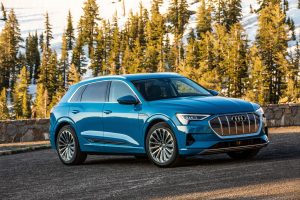Busting the myths around car salary sacrifice
Thinking of getting a new car through your employer’s car salary sacrifice scheme? Not sure where to start? Confused by information overload?
We get it. Choosing a new car is a big decision. Whether you need something roomy enough for a growing family or are after a super sleek city car that will fit the tightest of parking spaces, it can be hard to navigate the vast choice available.
Starting with the basics, car salary sacrifice schemes mean you exchange some of your pre-tax salary for the benefit of a car instead. Not only can you get a new car but there is no deposit to pay and all the main running costs including road tax, insurance, breakdown cover, servicing and maintenance are included in the price.
Lets tackle the myths we find online most often.
Myth 1 – It’s too expensive
False! There’s actually considerable savings with the salary sacrifice option. You can save all of your National Insurance on the amount you sacrifice for the car, you’ll often benefit from manufacturer discounts through the biggest employee benefit car providers and cost savings only paint part of the picture. There are also a range of value for money EVs coming onto the market from the likes of the MG 4 at less than £26,000 which reduces monthly salary sacrifice payments still further
Getting your new car via your employer’s scheme removes the cost of insurance, road tax, breakdown cover, servicing, MOT and maintenance including replacement tyres. Plus, there’s 0% deposit. Best of all, since April 2022, cars producing no CO2 emissions benefit from a 2% Benefit-in-Kind (BIK) tax rate, and this will continue until 2025. This could save you hundreds of pounds a month.
Find out more about BIK
Myth 2 – There’s not enough choice
Not true! You have an enormous range of salary sacrifice cars to choose from. From family hatchbacks and estate cars, to sleek and sporty to SUVs that are available in a wide range of electric and hybrid models, not only can you choose the car that’s right for you and your family but you can also enjoy all the benefits that come with a company car scheme.

Best of all, since April 2022, cars producing no CO2 emissions benefit from 2% Benefit-in-Kind (BIK) which is fixed until April 2025.
Myth 3 – Petrol cars are cheaper to run than EVs following recent rises in energy prices
Wrong, EVs are still the money saving option for drivers – using comparable combustion engine and electric cars – in this case a 58kWh Volkswagen ID.3 and a petrol Volkswagen Golf with a 130ps 1.5-litre petrol engine, we can see an EV driver would be better off in all scenarios. That is, before the additional financial benefits of salary sacrifice have been factored into the cost calculations.
*Our scenario would see the ID.3 charged at home via a 7kW home charger at 34p/kWh, and the Golf fuelled at an average fuel cost of 165.5p per litre. Both driven for 10,000 miles per year, the electric ID.3 would be 7.3p per mile cheaper to run, a saving of over £730 or around £60.80 a month.
Comparing a company car with a salary sacrifice car the petrol-powered Golf 1.5 130PS at £25,590 attracts a BiK rate of 29%, which will cost a lower rate taxpayer £1,491 in tax, rising to £2,982 for a higher rate taxpayer.
The ID.3 at £36,140 incurs a BiK rate of just 2%. That equates to an annual tax bill of just £144.56 for the lower rate taxpayer, while a higher rate taxpayer would pay £289.12. That represents a saving for ID.3 drivers of £1,346 for lower rate taxpayers and £2,693 for higher rate taxpayers.
You can also charge for free through the UK’s public charging network, take a look on Zap Map to see if there is a point near you.

Myth 4- It could impact my workplace pension
Not necessarily! When you opt for a car salary sacrifice scheme, you agree to exchange some of your pre-tax salary for a benefit instead. Therefore, people can assume that a lower salary figure will be used to calculate salary dependent benefits like your pension.
However, whether salary sacrifice impacts your pension or not will depend on the pension scheme your employer operates and its rules. Some employers choose to create what’s called a ‘notional’ or ‘reference salary’ which is used for such calculations. This notional salary is your pay rate before any salary sacrifice arrangements. So, if your salary was £30,000 before a car salary sacrifice (or any other salary sacrifice), your employer will use £30,000 as a reference when calculating other benefits like pension contributions. However, other pension schemes, particularly defined benefit pensions – like career average schemes – will be impacted. That’s because employers look at an individual’s average pay over the course of their career and calculate the pension on that basis. A reduction in pay via salary sacrifice will reduce your average earnings across your career and therefore your pension.
If you’re in a final salary pension scheme, salary sacrifice will only impact your pension if you exchange (and therefore reduce) some of your salary in the years before retirement or leaving the organisation. This would impact your final salary on which your pension calculation is based. Does this mean it’s not worth taking up a car via salary sacrifice if you’re in a final salary pension scheme? Not necessarily. A salary sacrifice car could be vital in getting you to work to earn a wage and accrue a pension. And, if the arrangement is better than any deal you could get on the high street, what you lose in pension could be offset in savings. Plus, you could always stop any salary sacrifice arrangements pre-retirement or upon leaving the organisation to ensure your final salary is at its highest.
There’s a lot to consider here, so ask your pensions team to calculate the impact on your pension and compare this with the savings you’ll make via salary sacrifice. This way, you’ll be armed with the facts to help you make the right decision.
Myth 5 – It’ll make it harder to get a mortgage
False! Your notional salary isn’t only used to calculate compensation or benefits. Your employer is also likely to use it to provide confirmation of your earnings if you apply for a mortgage. In the current climate, your mortgage provider will be keen to check your outgoings to ensure you can afford repayments. And your car benefit will form part of this review.
Plus your monthly motoring costs are fixed on salary sacrifice as they include all maintenance so you won’t have to worry about the increased associated with the running costs of older cars. It should increase your spare income that running your own care or even driving a company car.
Conclusion: Is a car salary sacrifice scheme worth it?
As you can see, there are a range of benefits that come with salary sacrifice car schemes. You can save money, access tax benefits, reduce maintenance costs and choose a great car that’s right for you.
Want to find out more? Take a look at the great savings you could make to help you decide whether car salary sacrifice is right for you. No deposit, no credit check and a convenient and inclusive benefit. Sign up and see for yourself.
Create an account*Calculations are based on a VW Golf 1.5, with a WLTP figure of 51mpg and a range of 504 miles. With a UK average fuel cost of £165.5 per litre (19th September source: gov.uk), the Golf costs 14.7p per mile to run, compared to the ID.3 which would cost 7.4p per mile to run if charged at home for 34p per kWh (Source: EPG based on UK average)

